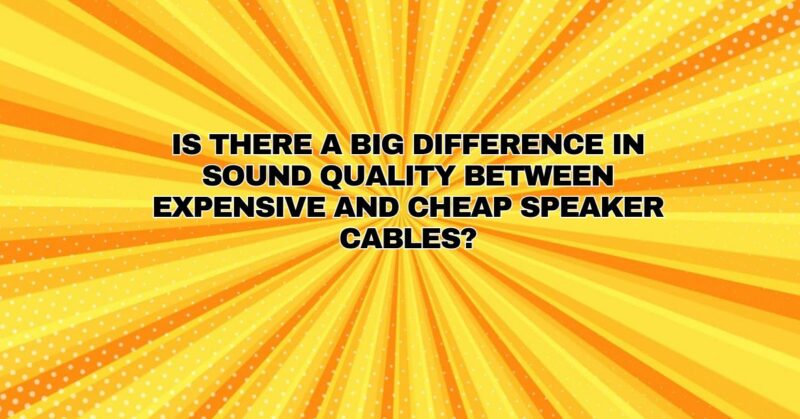When it comes to building a high-quality audio system, enthusiasts often debate whether expensive speaker cables are worth the investment or if affordable options will suffice. The question at the heart of this debate is whether there is a significant difference in sound quality between expensive and cheap speaker cables. In this comprehensive guide, we’ll explore the factors that influence speaker cable performance, the arguments on both sides of the debate, and whether you should consider investing in pricier cables for your audio setup.
The Basics of Speaker Cables
Speaker cables are an essential component of any audio system. They carry the electrical signals from your amplifier or receiver to your speakers, allowing you to hear the sound produced by your audio source. Speaker cables consist of two conductors—one for the positive signal and one for the negative signal—and are typically made of copper or other conductive materials.
Factors That Influence Speaker Cable Performance
Several factors can influence the performance of speaker cables, including:
- Cable Gauge: The thickness of the cable, measured in American Wire Gauge (AWG), affects its resistance to electrical current. Thicker cables generally have lower resistance and can carry more current, making them suitable for longer cable runs and high-powered systems.
- Conductor Material: Copper is the most common conductor material due to its excellent conductivity. However, some high-end cables may use other materials like silver or gold, which have slightly better conductivity but come at a significantly higher cost.
- Cable Length: Longer cable runs can introduce resistance and capacitance, potentially affecting the signal quality. In such cases, using thicker cables can help mitigate these issues.
- Insulation and Shielding: The insulation and shielding of speaker cables can impact their resistance to interference and signal degradation. Better insulation and shielding can reduce the risk of electromagnetic interference (EMI) and radio frequency interference (RFI).
- Connectors: The quality of connectors, such as banana plugs or spade connectors, can affect the ease of installation and the durability of the cable.
The Debate: Expensive vs. Cheap Speaker Cables
The debate surrounding expensive vs. cheap speaker cables often centers on whether investing in high-end cables results in noticeable sound quality improvements. Here are the key arguments on both sides:
Arguments for Expensive Speaker Cables:
- Enhanced Sound Quality: Proponents of expensive cables claim that they can deliver cleaner, more detailed audio with improved clarity and transparency. They argue that high-quality materials and construction can reduce signal loss and interference.
- Higher Build Quality: Expensive cables are often built with meticulous attention to detail, including better insulation, shielding, and connectors. This can lead to more reliable and durable cables.
- Matching High-End Systems: Advocates argue that if you’ve invested in a high-end audio system with top-tier components, using high-quality cables can ensure that you’re getting the most out of your setup.
Arguments for Cheap Speaker Cables:
- Diminishing Returns: Skeptics argue that the law of diminishing returns applies to speaker cables. They claim that while expensive cables may offer marginal improvements, the difference in sound quality is often not proportionate to the price difference.
- Subjectivity: Sound perception is highly subjective, and what one person considers an improvement, another may not notice. Some listeners may not discern any difference between expensive and cheap cables.
- Alternative Upgrades: Critics suggest that the money spent on expensive cables could be better allocated toward other audio components that have a more significant impact on sound quality, such as speakers, amplifiers, or room acoustics.
Scientific Studies and Expert Opinions
Scientific studies on the subject have produced mixed results. While some studies have found measurable differences in cable performance, others have concluded that the impact of speaker cables on sound quality is minimal and difficult for most listeners to discern in blind listening tests.
Audio experts often emphasize the importance of selecting cables that meet the requirements of your specific audio system. Factors like cable length, gauge, and connectors should be chosen based on your setup rather than price alone.
Conclusion: Making an Informed Decision
In the end, the choice between expensive and cheap speaker cables largely depends on your priorities, budget, and the specific characteristics of your audio system. If you have a high-end system and are looking for the best possible sound quality, experimenting with quality cables might be worth considering. However, for most listeners, investing in good-quality, reasonably priced speaker cables that match the needs of your setup is a practical and cost-effective choice.
Ultimately, the quest for better sound should be a balance between various components of your audio system, including speakers, amplifiers, source devices, and cables. While speaker cables can influence sound quality to some extent, their impact may not justify the substantial price tags of some high-end options. As with any audio equipment, it’s essential to evaluate and audition different cables to determine what works best for your ears and your budget.


